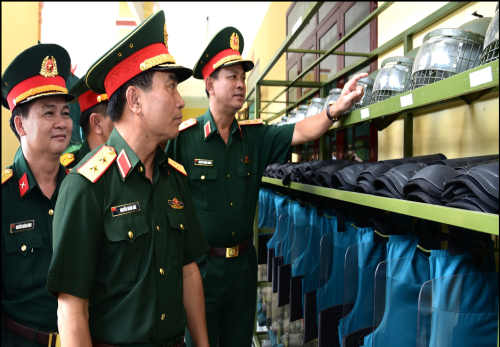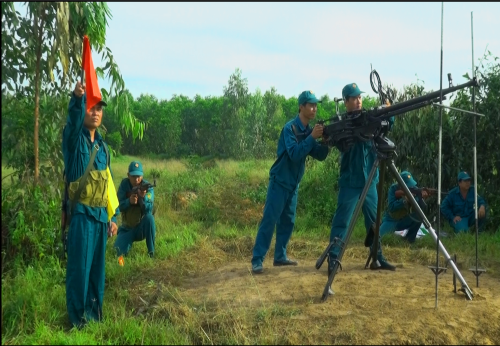Organisational models and activities of enterprises’ core political forces in Binh Duong province
Based on the local realities and Military Region 7 Command's line, Binh Duong Provincial Military Command has advised on forming core political forces (reservists) working at enterprises in the locality. This new model has produced positive results, which needs researching and multiplying.
Thanks to its effective policies of investment attraction over the years, Binh Duong has been one of the country's fastest-growing provinces. Currently, there are 29 industrial parks, 12 industrial clusters and 1 Industry - Urban - Service Complex with nearly 70 thousand domestic and foreign enterprises (65,567 domestic ones), together with 4,211 foreign-invested projects with over 1.2 million employees, making significant contributions to provincial socio-economic development. However, while the number of employees of diverse qualifications, occupations and ages is increasing, infrastructure, incomes and benefit packages for employees at some businesses are inadequate, causing different social security problems. This has been used by hostile forces as a pretext for their incitement to strikes, walkouts, etc., adversely affecting manufacturing activities, socio-economic development, national defence and security in the locality.
 |
| The General Staff of the Vietnam People’s Army inspects the Standing Militia Platoon at My Phuoc Industrial Park |
Against this backdrop, in order to promptly grasp employees’ thoughts and wishes, to encourage them to abide by the Party’s line and the State’s policies laws as well as to support businesses’ manufacturing activities, the Provincial Military Party Committee and Military Command, grounded on Military Region 7 Command's line and Binh Duong’s Provincial Party Committee, advised the Provincial People’s Committee to issue Decision 05/QD-UBND, dated 23 May 2022 on building a project to form core political forces who are reservists working at industrial zones, clusters, companies, and factories (hereafter referred to as enterprises for short) in the locality. This led to the establishment of the Project's Steering Committee, comprised of a leader of the Provincial People's Committee (serving as Head of the Committee), a leader of the Provincial Military Command (serving as Standing Deputy Head of the Committee) and members from other departments, branches, and unions such as Provincial Mass Mobilisation Committee, Provincial Police Department, Provincial Finance Department, Provincial Labour Federation, Provincial Industrial Park Management Board, Provincial Business Party Committee, etc. The Steering Committee is responsible for assigning its members respective tasks and drawing up annual guidelines on the establishment, management and use of political forces (with reservists at the core). At the same time, it directly commands, monitors and inspects districts and cities’ implementation of the Project. The Provincial Military Command is in charge of advising the Steering Committee, inspecting and supervising the Project implementation. The People's Committees at district and commune levels and their respective military commands are tasked with directly organising and maintaining the activities of core political force groups. For the sake of the effectiveness of the Project, the Provincial Military Command has collaborated with other agencies to advise on a number of operational models of core political forces at enterprises in the locality.
Regarding the structure and components, military commands are to closely cooperate with relevant agencies to determine the number of reservists working at local enterprises and select based on their backgrounds and political standards, with priority given to party members and those with good political qualities, strict compliance with the Party’s line, the State’s policies and laws, local administrations and businesses’ regulations as well as with the ability to mobilise and persuade other employees to join the core political forces.
 |
| The Militia and Self-Defence Force joins a live-fire exercise with Division 5 |
As for organisational and operational principles, the core political forces are reservists who carry out tasks and obey orders from the person in charge, under the leadership and direction of steering committees at all levels. Members are to frequently provide leaders with information about the situation at their businesses, to firmly grasp and to promptly report thoughts and wishes related to employees’ life and rights, the security and order situation at their enterprises, incitement to strikes, illegal gathering, etc. On a quarterly basis, districts’ military commands are to hold meetings to assign tasks and make payments to ensure the activities of the core political forces. Every week, members of the core political forces are to monitor the situation and report to their team leaders face-to-face, via Zalo or by phone. Incidents or ominous signs of security breach at their businesses or residential areas should be promptly reported to their team leaders.
On the basis of closely following realities, the Project has shown preliminary feasibility in various aspects. After the one-year-plus implementation of the project, the organisation, construction, management and use of political forces with reservists working at local businesses as the core (comprised of 91 groups with nearly 2,000 members) have borne fruit, which has won widespread recognition. Throughout the implementation period, the core political forces collected and provided a lot of important information that functional agencies made the most of when the latter gave advice to local party committees and authorities, thereby promptly addressing employees’ requests, thoughts and wishes, contributing to stabilising the situation and preventing strikes and walkouts from occurring, creating a stable investment environment for businesses, maintaining political security, social order and safety.
However, admittedly, the core political forces have yet to be effective enough in understanding and reporting the situation, as evidenced by limited prediction capabilities, poor information gathering skills, etc. To overcome those limitations and further improve the effectiveness, the Provincial Military Command will continue to make every effort to ensure the effective implementation of the Project with emphasis placed on the following.
Firstly, it is vital to promote awareness of party committees and authorities, and bring into full play the role of the Steering Committee, especially military commands at all levels, in building, managing and using the political forces with reservists at the core. To this end, military party committees and commanders should proactively advise the Steering Committee, local party committees and authorities on policies and measures to raise public awareness of the importance of the Project for the task of socio-economic development and maintenance of political security as well as social order and safety. It is necessary that cadres and party members thoroughly grasp policies, directives, plans and instructions by Military Region 7 Command, the Provincial Party Committee, the Provincial People’s Committee and the Provincial Military Command on implementing the Project and using core political forces. The work of building, managing and using core political forces is to be placed under the leadership and management of the Steering Committee, with its members being charged with duties while a sense of responsibility should be promoted among political commissars. Doing so will yield deeper insight into the Project and encourage broader participation in the implementation thereof.
Secondly, much importance should be attached to building, recruiting, managing and using the political forces with reservists at businesses as the core to meet task requirements. Accordingly, military commands at all levels should stick to the Project’s time frame to ensure its effectiveness. In the immediate term, it is necessary to focus on strengthening the existing core political forces, and instilling political will, morality, healthy lifestyle, and compliance with laws, local regulations as well as businesses’ rules. The election and admission of core political forces are to ensure quality and meet designated criteria focusing on large-scale enterprises which are prone to strikes and walkouts, foreign-invested enterprises, joint venture enterprises and enterprises without party organisations.
Thirdly, due attention should be paid to regular training in order to hone the core political forces’ skills, while ensuring benefits and appropriate policies for them. The training should focus on methods of identifying and approaching targets; skills of evaluating the situation, processing information and reporting to the person in charge; skills of properly guiding public opinion, etc. Regarding allowances, the core political forces are entitled to responsibility allowances according to Article 3, Decree 79/2020/ND-CP of the Government (extracted from the provincial budget by permission of the Provincial People's Committee). The core political forces with excellent achievements are entitled to just reward in accordance with the Law on Emulation and Commendation. At the same time, party committees at all levels are to regularly pay attention to policies, gradually creating favourable conditions for the core political forces to successfully complete their assigned tasks.
Senior Colonel NGUYEN DINH CHUAN
Political Commissar of Provincial Military Command